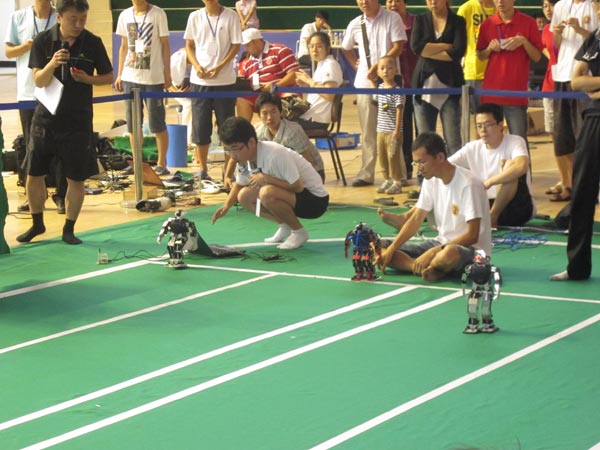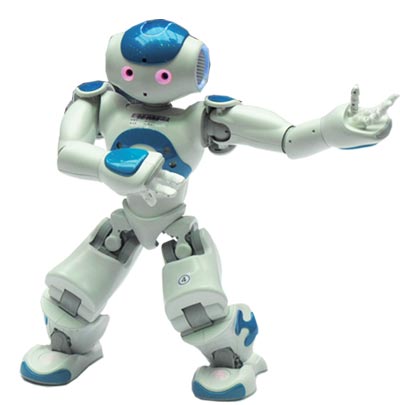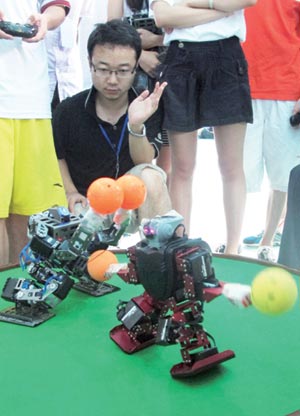Glimpse of the future
Updated: 2012-08-07 10:11
By Wang Kaihao (China Daily)
|
|||||||||||
 |
|
Robots contest in the six-meter sprint category at the International Humanoid Robot Olympic Games in Harbin, Heilongjiang province. Photos by Wang Kaihao / China Daily |
 |
|
A robot performs at a nationwide humanoid robot dancing competition in Fujin, Heilongjiang province. |
Will robots take over more than our household duties in years to come? Wang Kaihao checks out the International Humanoid Robot Olympic Games in Harbin.
Two contestants stare at their screens as they remote control their robots in a fierce fight. Their robots of about 30 cm high - one slightly bigger than the other - are performing a miniature version of Real Steel, an American science fiction sports drama, on the one-square-meter arena.
The bigger robot uses a combination blow, but misses its target. It loses balance and falls down. Unfortunately, it fails to stand up within 10 seconds, and was eliminated in the first round of the game.
"It really doesn't matter if my robot wins," says its owner, Serge Vlasov, a graduate student from St. Petersburg-based National Research University of IT, Mechanics, and Optics. "I came here for fun."
Vlasov is one of the participants of China's third annual International Humanoid Robot Olympic Games, held between July 25 and 28, in Harbin, Heilongjiang province. The competition is organized by Chinese Association for Artificial Intelligence (CAAI).
The Russian student is surprised to find more than 500 contestants from 70 universities and institutions all over China and overseas, bringing with them 700-odd humanoid robots. Vlasov says Russia does not have such an annual large-scale national contest.
The games, which is China's largest robot sport meeting, includes 27 categories.
Jia Lei, a junior undergraduate student from Harbin Far East Institute of Technology, is overjoyed that his robot won first place in the six-meter sprint category, at 23.17 seconds.
"It has a very powerful electric motor, which makes it run very fast," says Jia with pride. "But for the longer distance race, it will need another more powerful motor."
The "long distance race" he refers to is a 20-meter-long track.
 |
|
Boxing is among the 27 categories at the games, which is China's largest robot sport meeting. |
"Many contestants assemble these gadgets rather than design their own," says Hong, who is also a professor at Harbin Institute of Technology (HIT) and has been experimenting with robots since 1977. He says about 90 percent of the robots in the contest are of foreign moulds, and South Korean robots are among the most commonly used.
A contestant from Dongguk University in South Korea, Kim Eun-hyun, says the competition was easier than those he had participated in his home country and Europe.
"In the other competitions I've participated, there is a component on embedded software, which encourages creativity. It is a pity that this contest doesn't have that," Kim says.
But the competition saw some new innovations. Hong who also heads the Chinese division of the Federation of International Robot-Soccer Association (FIRA), says he is delighted to see some domestic teams who have brought their own creations.
For example, Wang Hongpeng, a computer science professor from Shenzhen Graduate School of HIT, brought some robots with embedded computer controller to the competition. These robots did not need remote controllers like the others.
"We hope to commercialize these technology but who is going to invest? The process usually takes longer in China than in some other countries," says Hong.
Since 2008, Hong has also been involved with miniature humanoid robots.
He says a national project to study humanoid robot has been launched more than a decade, and some universities in China have developed human-size humanoid robots with autonomic response capacity. But he opines that studies on humanoid robots will progress faster if the academia pays more attention to miniature ones.
"It's not right to treat them as toys. They are humanoid and should be treated in the same way as the growth of humans - from infancy first."
Hong expects more robots to take on household duties in the near future and that explains why he has added some special items for the first time in the contest, including carrying trays, pulling carts and collecting rubbish.
"Robot is a lovely mechanical spirit which mixes math, electronics, computer science and machinery together," says Li Deyi, chief of CAAI and an academician at Chinese Academy of Engineering. "But people tend to feel disconnected from it in their daily life. We have to create public awareness so that the general public accepts the wider use of robots. That is the aim of this competition."
Hong says he is proud to see a team from HIT presenting a dancing robot on stage at the 2012's CCTV Spring Festival Gala. "Dancing requires a lot of coordination using different parts of a robot. If we can understand the technical details of each function, it could lead to further understanding of other technical fields," Hong explains, adding that CAAI organized its first nationwide humanoid robot dancing contest in Fujin, Heilongjiang province, on July 30.
One of the participants is Yan Xin, 19, a student of HIT, who is also a member of the institute's Innovative Center - a club to encourage students to participate in the study of robot sports. There are now 46 members, mostly undergraduates.
Yan says his team slept very little for a whole week to prepare for the contest. Their hard work paid off when his team won five out of nine categories in the humanoid robot dancing contest.
Hong says he is happy with the creativity of the young contestants in the contest. "We need the inspiration of more young people. I'm 77 years old, and I cannot be a general without an army. I want to retire, but it is not the right time yet," he says.
Contact the writer at wangkaihao@chinadaily.com.cn.
Related Stories
Invasion of Ultraman noodles 2012-07-18 16:51
Circuit breakers 2011-12-27 09:28
Building the new from the old 2012-06-13 10:32
'Evolta' robot swims in Tokyo 2011-09-15 16:55
Today's Top News
Rescuers race against time for quake victims
Telecom workers restore links
Coal mine blast kills 18 in Jilin
Intl scholarship puts China on the map
More bird flu patients discharged
Gold loses sheen, but still a safe bet
US 'turns blind eye to human rights'
Telecom workers restore links
Hot Topics
Lunar probe , China growth forecasts, Emission rules get tougher, China seen through 'colored lens', International board,
Editor's Picks

|

|

|

|

|

|





